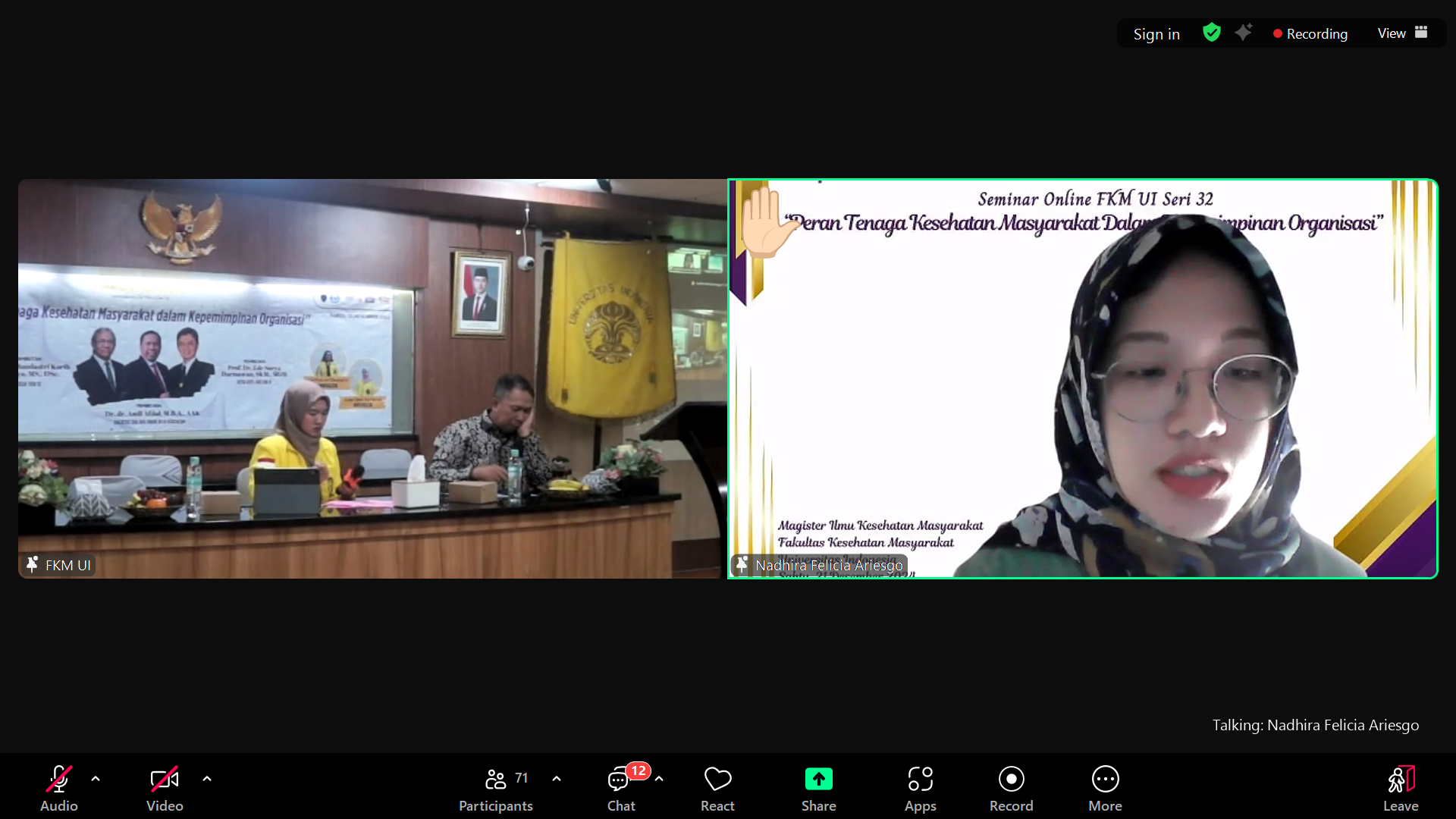The Faculty of Public Health (FPH) at the Universitas Indonesia (UI) once again organized the 32nd Online Seminar with the theme “The Role of Healthcare Workers in Organizational Leadership.” This event, held on Saturday, December 21, 2024, was attended by students and healthcare practitioners in a hybrid format, both at the Doctoral Promotion Room, Building G of FPH UI, and through Zoom Meeting. The seminar, managed by the Postgraduate Program students of FPH UI, discussed the strategic role of healthcare workers in organizational leadership, particularly in the public health sector, to address the ever-evolving challenges.
In her opening speech, Dr. Ir. Asih Setiarini, M.Sc., Vice Dean for Education, Research, and Student Affairs of FPH UI, emphasized that the theme was highly relevant to the developments in public health. According to her, public health workers not only play a role in direct healthcare services but also bear a strategic responsibility to lead effectively at various organizational levels.
“Leadership is not something that starts when someone holds a certain position, but it is rooted in the ability to take initiative, communicate well, and influence others to achieve common goals, whether at the community, institutional, or healthcare organization level,” said Dr. Asih. Healthcare workers have a vital role as change drivers, not only understanding health issues but also integrating cross-sectoral approaches to tackle public health challenges. “Moreover, the ability to design policies and manage resources effectively is also part of the responsibility that healthcare workers must bear in fulfilling their role,” added Dr. Asih.
The seminar featured several experts in the field who discussed the complexity of challenges in the public health sector, one of whom was Prof. Dr. Ede Surya Darmawan, S.K.M., M.D.M., Chair of the Department of Health Administration and Policy (AKK) at FPH UI. In his presentation, Prof. Ede explored important dimensions such as management functions, resource transformation, and challenges in building relevant and competitive strategic leadership. According to Prof. Ede, the main function of management is to convert resources into performance through effective strategic leadership. “Leadership is not just about titles, but how someone can create effective habits to produce effective organizations. Effective people create effective organizations,” he emphasized. Prof. Ede also explained that leadership exists at all levels of the organization, with the main goal being to maintain the quality of healthcare services.
Prof. Ede highlighted the importance of hard work to harness the demographic bonus, although Indonesia still faces significant challenges in keeping up with developed countries. “Indonesia’s Human Capital Index (HCI) is currently at 0.54, far below Singapore’s 0.88 and Malaysia’s 0.61. This directly affects productivity and national competitiveness on the global stage,” he said.
Prof. Ede also identified several challenges, such as the demographic transition towards an aging population by 2045, the digitalization that triggers sedentary lifestyles, regional disparities, and the increasing cases of non-communicable diseases. Furthermore, the lack of harmonious planning between the central and regional governments remains a key obstacle in addressing these challenges. According to Prof. Ede, the transformation of primary healthcare services must be emphasized to tackle these issues. “Education for the population, primary and secondary prevention, and strengthening primary healthcare services should be prioritized,” he said. Prof. Ede also saw digitalization as a great opportunity to support Indonesia’s healthcare ecosystem. However, he pointed out the need for system integration. “Currently, there are over 400 government applications that are not integrated. This results in inefficiency in managing healthcare data, which remains a significant task,” he explained.
As part of efforts to strengthen the understanding of leadership in the healthcare sector, Dr. dr. Andi Afdal, MBA., AAK., Director of HR and General Affairs at BPJS Health, also delivered relevant material. In his session, Dr. Andi highlighted the urgency of strengthening primary healthcare services as a key strategy to reduce the increasing burden of long-term care costs. Dr. Andi presented that national healthcare service costs have shown a significant upward trend year after year, totaling IDR 90.33 trillion in 2021, IDR 113.47 trillion in 2022, and reaching IDR 158.9 trillion in 2023. “Every day, 1.92 million participants utilize JKN services throughout 2024, equivalent to 1,334 utilizations per minute. This shows the importance of ensuring accessibility and the quality of healthcare services for the public,” he explained. Furthermore, the two essential elements of leadership in all contexts are the ability to bring change in a positive direction and create real benefits for others. “Good leadership always starts with yourself. Being a good leader always starts with yourself—manage yourself first, then manage your team,” Dr. Andi stated. A holistic approach needs to be emphasized in leading an organization, including an excellent mindset, purposeful behavior, and outcomes that can create added value for all involved parties (create value).
Completing the perspectives on strategic leadership, the seminar also featured insights from the younger generation, including a presentation by Rabiatul Adawiyah, S.Gz., a postgraduate student at FPH UI. In her session, Rabiatul discussed survey results on strategic leadership and systems thinking, illustrating the urgent need for self-development, increased awareness, and an inclusive learning culture within organizational environments. It is hoped that the insights gained will motivate participants to remain actively involved in leading organizations and creating positive changes in the public health sector. FPH UI is committed to continuing to support the development of knowledge and strategic leadership relevant to societal needs, as well as encouraging cross-sector collaboration to achieve a better and more sustainable healthcare system. (DFD)

